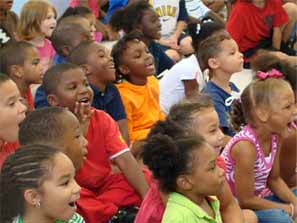 So, I am imagining a hypothetical school. Math scores are down and reading scores don't look good. Well meaning federal regulations insist these scores must rise. Worried administrators face a decision. What can be done?
So, I am imagining a hypothetical school. Math scores are down and reading scores don't look good. Well meaning federal regulations insist these scores must rise. Worried administrators face a decision. What can be done?
I envision an ex-football coach Superintendent announcing to his district that from here on out there will be changes. Extra time is to be spent on Math and Reading. In fact, a mandatory reading block will be inserted into the morning for every school. "We will focus on Reading! And extra time will be spent on Math!"
But then a worried hand or two will rise and beg the question " How do we find this extra time when our days are already crammed full?"
"Simple!" comes the reply, "We will be cutting out anything that isn't essential. No more field trips. No more school assemblies. We are eliminating music and art. In fact we are even reducing the amount of time spent on history. Math and Reading, that is what we will teach!"
And really, it does make sense, doesn't it? If the authorities demand better scores in reading and math then focus more time and attention on teaching reading and math.
But the dirty little secret is this... it doesn't work.
Sorry. It is seems like it should, but it doesn't.
Why?
It doesn't work because our minds don't learn the same way our bodies do. In sports, endless repetition and practice builds better performance. But our minds don't learn the way our muscles do, and we all learn differently. Within each of our brains, there are several different "centers of learning", each charged with absorbing different aspects of the world. For example, there is a center for physical agility. There is a center for verbal constructs and language. There is a center for social relationships. And there are centers dealing with numbers and words. Each center develops differently in different humans. Very few of us are well developed in all the different centers. And so it is that one kid is especially good at sport, but terrible at math. Another is a social favorite but cannot read well. And so on.
How do we encourage these kids to be better in the areas where there skills are lacking?
According to a leading expert in child learning, the answer is somewhat counterintuitive. To increase the ability of a student in the area where they are struggling you must locate and bolster the area where they are strong. Once their self-confidence is increased as a result of success in their strong suit, further success follows in areas where they were struggling. Whereas, simply clamping down and hammering away at an area where a child is struggling will only lead to humiliation, erosion of self-image and further failure.
 Meanwhile, other experts have insisted that the schools that truly succeed on standardized testing are the schools that offer "a rich and vibrant curriculum". This supports the idea that broad based general education still works best for meeting specific educational goals.
Meanwhile, other experts have insisted that the schools that truly succeed on standardized testing are the schools that offer "a rich and vibrant curriculum". This supports the idea that broad based general education still works best for meeting specific educational goals.
And yet time after time, well-meaning educators choose the simple answer, rather than the correct answer. It reminds me of a favorite quote, coming from H.L. Mencken.
"For every complicated question there is a simple answer .... and it is wrong."
I often think of that quote in reference to politics, but it applies sometimes in education as well. "Time on task" does not just mean denying students anything but a book, a teacher and lots of time in a classroom. There is a place in a "rich and vibrant curriculum" for activities that are outside the normal and thus produce a different type of learning in young minds. There is a place for field trips, and there is a place for school assemblies. There is a place for a visit inside a planetarium, or an interlude with a set of wild animals or a visit from Ben Franklin. There is a place for counterintuitive education. Educational school assemblies are "time on task!"
Geoff Beauchamp is the Regional Manager of Mobile Ed Productions where "Education Through Entertainment" has been the guiding principal since 1979. Mobile Ed Productions produces and markets quality educational school assembly programs in the fields of science, history, writing, astronomy, natural science, mathematics, character issues and a variety of other curriculum based areas. In addition, Mr. Beauchamp is a professional actor with 30 years of experience in film, television and on stage. He created and still performs occasionally in Mobile Ed's THE LIVING LINCOLN.






